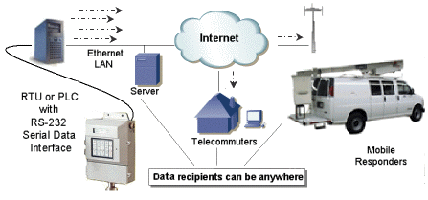

SimpleComTools, LLC
Serial Stream-UDP Multicast™
SimpleComTools, LLC
3
OVERVIEW
SimpleComTools Serial Stream-UDP Multicast™ SerialStream-UDPMulticast
TM
is a software
solution that provides UDP transport of serial data streams to individual or groups of remote hosts
via the UDP protocol.
SerialStream-UDPMulticast™ can detect any ASCII, HEX, or BINARY serial data stream on an
RS-232 port of a Microsoft Windows PC, and send that exact data stream to any pre-defined
group of IP addresses (or domain names) simultaneously. This makes Serial Stream-UDP
Multicast™ perfect for numerous applications, including:
Broadcasting serial devices alarm messages to network management servers
Broadcasting serial GPS data streams to multiple remote GPS survey receivers
Sending serial GPS data stream to remote server and local PC UDP port
Sending serial text message updates to variable message signs
Sending serial keepalives to multiple network devices
Serial Stream-UDP Multicast™ can be easily installed on any Windows-based computer, and is
ideal for numerous types of applications:
Network Administrators
SCADA/Telemetry Engineers
Utilities Companies
Land surveyors and contractors
Telecom Engineers
Security Companies
Here’s how Serial Stream-UDP Multicast™ works…
Install SerialStream-UDPMulticast™ on the PC or server. Connect the serial data device using an
RS232 cable. Now set SerialStream-UDPMulticast™ to listen for data on that physical COM port,
and configure the UDP packet recipients. You can now have the serial data streams being sent to
your local PC IP address, or any number of multiple remote IP addresses on a user-configurable
UDP port.
About UDP vs. TCP
The most commonly used network protocols today are TCP (Transport Control Protocol) and
UDP (User Datagram Protocol). TCP is a proven and reliable protocol, and probably the most
widely implemented protocol in use on IP networks today. However, TCP has a lot of overhead
and payload issues, and can sometimes be ‘too-reliable’ or robust for many applications. In fact,
when used as transport, for many serial based applications TCP can actually hinder reliable
communications. In contrast, UDP is a much simpler protocol, and is being used more frequently
today - particularly in areas where bandwidth or throughput is constrained. An example is the
predominant use of UDP for transport of wireless data applications.

